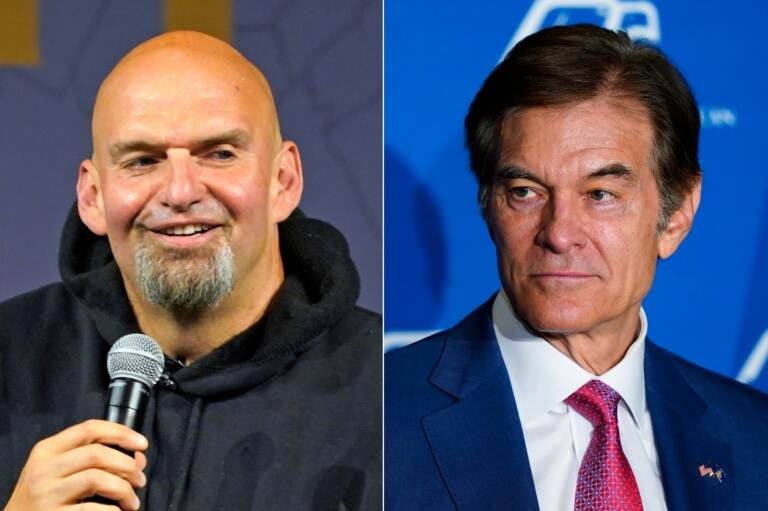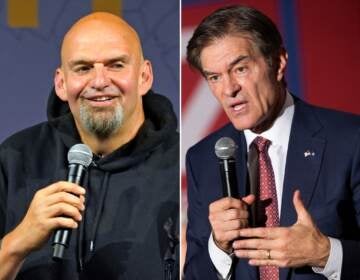All eyes on Pa. Senate race as Fetterman and Oz hit the debate stage tonight
Fetterman and Oz on Tuesday will participate in their first and only debate of Pennsylvania's high-stakes U.S. Senate race.

Pa. Lt. Gov. John Fetterman (left), the Democratic nominee for the state's U.S. Senate seat, and Dr. Mehmet Oz, the Republican candidate. (AP Photo/Gene J. Puskar and Matt Rourke)
This story originally appeared on WESA.
The moment Republican Mehmet Oz and Democrat John Fetterman take the stage at 8 p.m. Tuesday tonight could become the climax of their race for the U.S. Senate this year.
That’s because Oz has made Fetterman’s decision to only debate once a central theme of his recent campaigning, drawing attention to Fetterman’s health as he recovers from a stroke in May.
Fetterman’s own campaign released a statement yesterday calling the debate “unprecedented — there’s never been a closed captioning political debate in a high profile Senate race” before. And it played down expectations for Fetterman himself, noting media criticism of his performance in debates prior to his stroke — and labeling Oz, a celebrity TV doctor, as “a media-savvy performer.”
Since returning to the campaign trail in August, Fetterman continues to struggle with his auditory processing. That means he sometimes combines two similar words or has trouble remembering a word, and that he can read words more clearly than hear them. During the debate, he’ll use closed captioning to ensure that he understands what is being spoken to him — a practice he has used in multiple media interviews. While his doctors have offered a sunny prognosis, stroke experts say there is no guarantee that these issues will completely go away.
But he has participated in lengthy discussions about policy with reporters and both Fetterman’s cardiologist and his general practitioner have released letters saying he is healthy enough to serve in office. Dr. Pooja Khatri, one of the country’s leading stroke experts at the University of Cincinnati, said in an email that the doctors’ letters are “reassuring” but “not as detailed” as what could be provided by Fetterman’s neurologist.
Rebecca Katz, a senior advisor to Fetterman, said that voters can already see for themselves how Fetterman has been doing. “Voters in Pennsylvania have actually been watching John recover in real time through the last couple of months,” she told WESA last week. “They can see him talking for longer. They can see him speaking better.”
Katz said that Fetterman typically meets with his campaign staff on Google chats, using closed captioning, the same way he has been conducting press interviews. This will be true during the debate as well. And as someone who used to work for former Sen. Harry Reid, Katz said Fetterman will be able to use closed captioning on the Senate floor if he is still struggling with auditory processing.
“Being a U.S. senator is probably one of the best jobs in America if you need staff to help you figure” out how to use closed captioning, she said. “Even if these lingering effects are still happening in January, this is not something that’s going to hold him back in the least.”
Ordinarily, debates between Senate candidates “attract very few viewers,” but this campaign may be different, according to Kathleen Hall Jamieson, a communications professor at the Annenberg School of Communication at the University of Pennsylvania. “The undecided public is more likely to be watching this debate than others and be watching to determine whether or not they are comfortable with [Fetterman’s] command of the issues.”
That may present a challenge for Fetterman, said Democratic consultant Matt Merriman-Preston, because most people don’t watch the debate itself but instead view short clips and soundbites of the debate later on the news or social media. Such viewing habits could make it easier for Republican operatives to isolate snippets that make Fetterman sound unable to do the job, no matter what his overall performance.
“That doesn’t mean that debates can’t be informative, but it does give a certain way of thinking about how the campaigns need to approach the debates in order to [reach] the voters who still need to make up their mind,” Meriman-Preston said.
And with polling that suggests the race between Oz and Fetterman is tight, Tuesday night’s debate could prove pivotal. “Even if one debate does not swing polling numbers by huge numbers, we know that small changes could be the difference,” Meriman-Preston said.
Jamieson said soundbites aren’t a good way of judging whether a candidate is capable of doing the job. She does a classroom exercise in which communications students choose transcripts of the country’s best political speakers, and she asks them to find moments where the speakers misspeak. And every candidate messes up when they are speaking extemporaneously, she said.
So the media has to be careful not to choose clips that stand out but unfairly represent what happened during the debate. “The challenge is making sure that whatever moment is represented as a moment that typifies Fetterman’s performance is not a moment that is taken out of context to draw an inappropriate inference given the totality of the performance,” she said.
Jamieson said voters should focus on what the candidates actually say about their stances and what they will do if elected. A lot of discussion around debates is about tactics or about who won, a focus that can distract voters from learning about key differences between candidates.
And Jamieson said debates are important for another reason: They can provide a way to hold candidates accountable once they take office.
“Most people who are elected actually do try to act on their promises,” she said. “Most of the actions people take in governance … are forecast in their campaigns.”
The debate will air on WXPI in Pittsburgh. WHYY will have audio of the debate available, along with a live fact-check.

Your go-to election coverage
WHYY is your source for fact-based, in-depth journalism and information. As a nonprofit organization, we rely on financial support from readers like you. Please give today.







